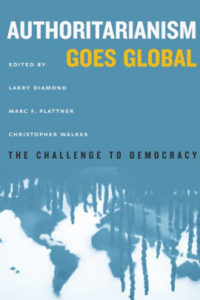 Across the globe, entrenched authoritarians tightened their grip last year – watch China, for instance. Relatively new authoritarians extended their crackdowns – Hungary, Turkey, the Philippines are a few examples. And troubling signs continued to arise in long-settled democracies like the United States and much of Europe, Viola Gienger writes for Just Security:
Across the globe, entrenched authoritarians tightened their grip last year – watch China, for instance. Relatively new authoritarians extended their crackdowns – Hungary, Turkey, the Philippines are a few examples. And troubling signs continued to arise in long-settled democracies like the United States and much of Europe, Viola Gienger writes for Just Security:
“Autocratic nationalism had a banner year,” Maria Stephan, director of the program on nonviolent action at the U.S. Institute of Peace, told Just Security. “We saw the rise of elected autocrats and far-right leaders who ran on anti-establishment and `law-and-order’ platforms, and then eroded democratic norms and institutions following their elections.”
Even in the United States and Europe, while it would be “both empirically incorrect and unhelpful” to describe them as sliding into authoritarianism, there are worrying signals, said Sheri Berman, a political science professor at Barnard College, in an interview. She sees “increasing support for what would be considered at the very least illiberal, if not undemocratic, alternatives…..Troubles with democracy in already democratic countries feed, both directly and indirectly, trends towards authoritarianism” in other countries already well on the road, Berman said.
![]() Christopher Walker, vice president for studies and analysis at the National Endowment for Democracy, cited a shocking case in an article for the July 2018 issue of Journal of Democracy, Gienger adds:
Christopher Walker, vice president for studies and analysis at the National Endowment for Democracy, cited a shocking case in an article for the July 2018 issue of Journal of Democracy, Gienger adds:
A Chinese-backed media conglomerate in 2014 managed to strike a deal with Australia’s public broadcaster that required the Australian outlet “to eliminate news and current-affairs content objectionable to Beijing from the respected ABC Mandarin-language service, both in Australia and overseas.” Walker described such tactics as “sharp power” and “part of a pernicious global pattern.”
“In an era of globalization coupled with authoritarian resurgence, the institutions of a growing number of democracies are straining to comprehend and to deal with the projection of authoritarian influence through more diverse channels than ever before,” Walker wrote. RTWT







